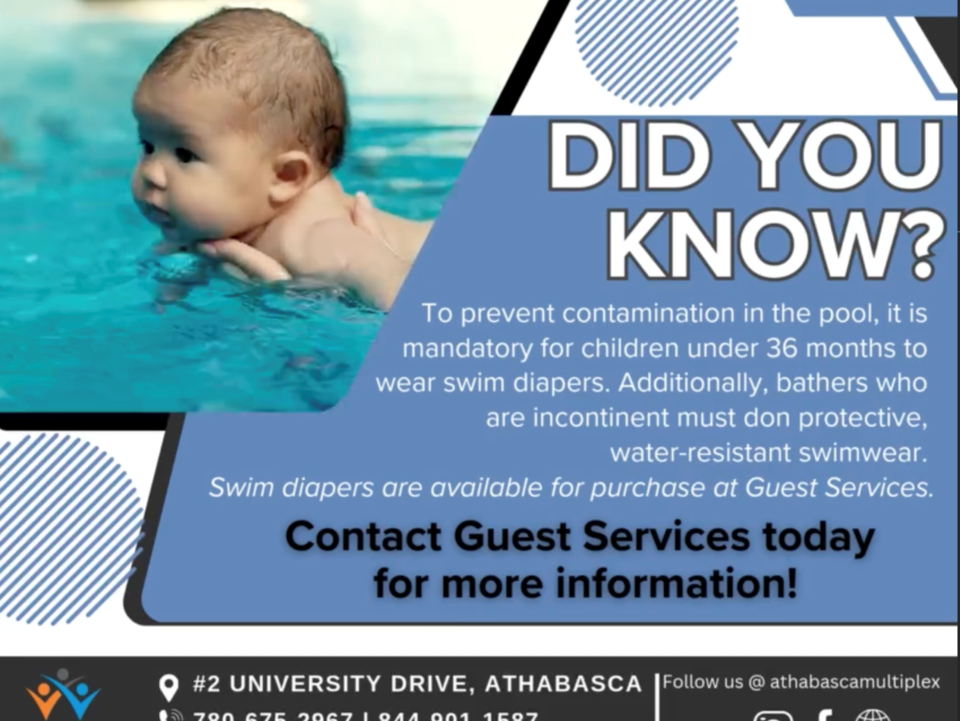ATHABASCA — A total of 2,534 locals and visitors took a dip in the pool at the Athabasca Regional Multiplex over the month of October, an increase of 122 guests over October 2023’s numbers.
Despite the high usage rates, aquatics supervisor Dylan Zilinski said the pool sees a low number of contamination events — bodily fluids or substances in the pool — compared to other facilities across the province.
“Our health inspector has said positive things about the limited number of contaminations we’ve had when they’ve reviewed our logs, and how nicely we track it,” Zilinski told Athabasca Regional Multiplex Society directors during their Nov. 18 meeting.
But low numbers don’t mean no contamination events, as evidenced by two recent pool shutdowns for contamination cleanup. Incidents in late October and early November caught directors’ attention and resulted in a lot of snickers, smirks, and outright outbursts of laughter from around the table.
“We were going very long periods of time — six, nine months — without seeing one, and now we’re seeing two or three in a row, and then none for a period.”
According to Zilinski’s report, on Oct. 19, staff noticed a non-solid, or diarrhea, contamination in the leisure pool, which led to a 16-hour cleanup and closure process.
“We were able to at least track the source,” said Zilinski, whose language garnered stifled laughs from directors. The culprit? A swim diaper that had reached and far exceeded its capacity, eloquently described as a “blowout” by director Rob Balay.
While the consensus between admin staff and directors around the table was accidents happen, especially when it comes to babies, Zilinski noted the cleanup process for non-solid fecal contaminations can be anywhere between 13 and 18 hours.
As per Alberta Health Pool Standards, chlorine levels need to be raised to 20 milligrams per litre of water for 12 hours and 45 minutes after a non-solid fecal contamination event. Lower chlorine to water ratios can be used but require a longer time period: one milligram of chlorine per litre of water would need 255 hours of disinfection time, and 10 parts per million (ppm) would need 25.5 hours of downtime.
“We adhere to this highest level of chlorine as it allows for the fastest reopen times,” said Zilinski. After the almost 13 hours are up, the pool may need additional chemical treatment depending on the type of contamination before it can be reopened to the public.
Water treatments for other types of contamination, such as blood, vomit, and solid fecal contaminations are also necessary, but only require chlorine levels to be raised to at least three ppm for a minimum of 25 minutes.
Guests using the pool at the time of a contamination event are evacuated and must take a cleansing shower. Lifeguards on duty ensure no guests are allowed to re-enter the pool before disinfection has occurred, and notices are posted on the facilities social media platforms announcing the closure and estimated down time.

A minor poo-roblem
While large contamination events are infrequent at Athabasca’s pool, the necessary closure times for cleaning do have an impact on programming.
“A pool being down for 16 to 18 hours equates to a full day of disruption, which can affect our entire schedule and the swimmers who use the facility regularly,” said Zilinski in a Nov. 21 follow-up email.
While not all contaminations require both the main and leisure pools to be closed at the same time, Zilinski said switching programs between pools isn’t always feasible, and contaminations in one pool can mean cancellations and rescheduling planned activities.
Suggestions as to how to further limit the number of contaminations were thrown out by directors, including possible education on the need for babies to wear swim diapers, which can be purchased at the pool, and even making them available to parents for no cost.
The board ultimately decided against offering the diapers for free, and Zilinski noted part of pool staff’s responsibility is to check for swim diapers on babies under 36 months as per facility rules. He and staff will even use pocket change from the lost and found to purchase diapers for guests without or in need of another during their swim.
“The $2, in my mind, is nothing compared to shutting the pool down for four hours or twelve hours, plus the chlorine costs,” said director Brian Hall.
Despite the recent contamination events, Zilinski said Athabasca’s aquatic centre’s incidents are low compared to other facilities across the province, thanks to a combination of good fortune and proactive preparation.
“One of the key differences in Athabasca is our community,” wrote Zilinski. “The people who come to swim here are genuinely enthusiastic about being at the pool and want to be able to come back tomorrow; they make an effort to follow the swim diaper rules.”
An education-first approach to facility rules and safe pool practices also helps. Even though a number of staff haven’t had to deal with an event, regular training on proper procedures and common practices utilized in other Alberta pools means employees are always ready for the unexpected.
Babies under 36 months using the Athabasca multiplex pool are required to wear a swim diaper, and bathers with incontinence must don protective, water-resistant bathing gear. New additions to the regulations include a two-week swimming hiatus for anyone experiencing diarrhea.


